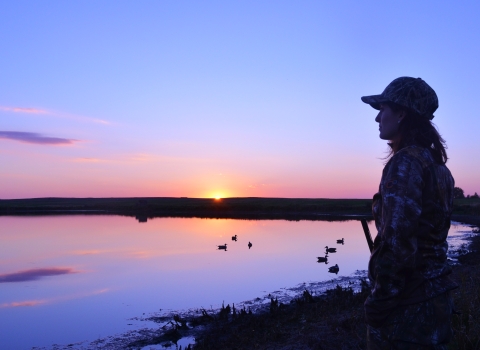BOSTON – The U.S. Fish and Wildlife Service, the National Oceanic and Atmospheric Administration, the Commonwealth of Massachusetts, and the State of Rhode Island announced a proposed settlement today, which, if approved by the court, will require Bouchard Transportation Company, Inc. and its affiliates to pay more than $13 million to settle outstanding federal and state natural resource damages claims for an April 2003 spill of up to 98,000 gallons of oil into Buzzards Bay. Today’s settlement compensates for injury to migratory birds. In addition to today’s settlement, Bouchard previously paid the federal and state natural resources Trustees $6 million to resolve the trustees’ claims for injuries to shoreline and aquatic resources, coastal recreational uses, and piping plovers, bringing the total combined natural resource damages recovery to over $19 million.
On April 27, 2003, the tug Evening Tide was towing the tank barge Bouchard B.120 from Philadelphia to Sandwich, Massachusetts, when the barge grounded on a shoal soon after entering the western approach to Buzzards Bay; its hull ruptured, the barge released its cargo – No. 6 fuel oil. For weeks following the spill, migrating birds such as loons and seaducks were exposed to oil as they fed in offshore waters, while terns and shorebirds tried to nest in the oiled shoreline along islands and beaches.
Biologists estimated that, in total, thousands of birds were killed as a result of the spill, including loons, terns, eiders, dunlins, scoters, and gulls. Common terns, a species of special concern in Massachusetts, and roseate terns, a state and federally endangered species, suffered severe losses from direct exposure to oil, as well as from habitat disturbance caused by clean-up efforts. The adult common terns’ deaths and nesting habitat disruptions were estimated to lead to the loss of thousands of tern chicks that would likely have been born in the absence of the oil spill. Additionally, scientists estimated that the spill killed more than 500 common loons.
“Coastal Rhode Island and Massachusetts provide important habitats for shorebirds, sea ducks and seabirds, and are destinations for birdwatchers from all over the world,” said Wendi Weber, Northeast Regional Director for the U.S. Fish and Wildlife Service. “Today’s settlement means we can help those migratory birds affected by the Bouchard oil spill, and help the communities that benefit from that ecotourism. We look forward to working with local organizations and state wildlife experts to restore the birds and protect their habitat.”
“Buzzards Bay is a national treasure and known throughout the world for its natural beauty, wildlife, commercial activities, and recreation,” said Attorney General Maura Healey. “This settlement will allow us to begin the work needed to address the oil spill’s devastating impacts on injured migratory bird species, while sending a message that those who damage our valuable coastal resources will pay a hefty price. We thank our state and federal partners for working with us to achieve this significant result.”
“The Commonwealth has a proud history of protecting species within our state, and we are pleased to join our federal and state partners to help support and preserve wildlife within the Buzzards Bay area,” said Energy and Environmental Affairs Secretary Matthew Beaton, who is the Natural Resource Damages Trustee for Massachusetts. “The proposed settlement funds will aid in Massachusetts’ ongoing efforts to restore loon, tern, and other bird populations impacted by the spill to their natural habitat, and enable the future growth of these important species.”
“Rhode Island is home to diverse and abundant wildlife populations and habitats,” said Rhode Island Department of Environmental Management Director Janet Coit. “This settlement will allow us to continue the important work of restoring the wildlife and places impacted by the 2003 oil spill into Buzzards Bay. I am pleased to join our state and federal partners in announcing this agreement and working together on a plan to restore migratory bird populations and habitat.”
If the settlement is approved by the court, the Trustees will develop one or more draft restoration plans with public input and once finalized, implement the projects designed to restore populations of affected bird species to what they would have been if the spill had not occurred. This process will be similar to the process the federal and state natural resource Trustees’ pursued after the first settlement to address impacts to shoreline and aquatic resources, coastal recreational uses, and piping plovers.
The federal and state Trustees have used the funds received under the first settlement, in 2010, to implement a variety of restoration projects through partnerships with state and municipal agencies and local organizations. The Trustees used those settlement funds to assist with the protection of nearly 450 acres of coastal habitats in Fairhaven and Mattapoisett, support quahog, oyster, and bay scallop restoration projects in nine towns around Buzzards Bay, and enhance public access to coastal areas. Public access projects include the construction of trails at parks and nature sanctuaries in Fairhaven, New Bedford, and Dartmouth, Massachusetts, installation of mobi-mats assisting physically-challenged persons with access to beaches at three Massachusetts state parks, and reconstruction of a public boat ramp in Wareham, Massachusetts. The Trustees also increased piping plover nesting success at locations along both the Massachusetts and Rhode Island shorelines through a variety of management actions. The Trustees are currently planning several additional projects to enhance aquatic habitat.
The proposed consent decree outlining the settlement was lodged in court today and is available at www.justice.gov/enrd/Consent_Decrees.html. It is subject to a 30-day public comment period.


